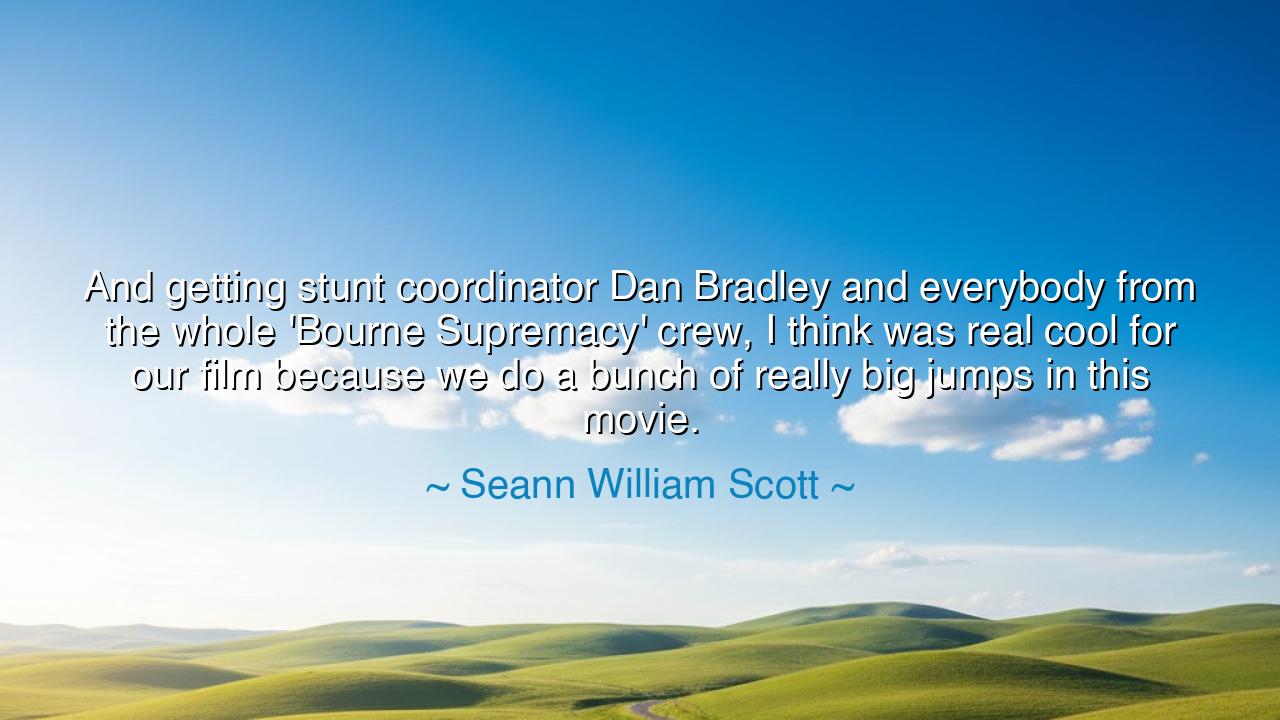
And getting stunt coordinator Dan Bradley and everybody from the
And getting stunt coordinator Dan Bradley and everybody from the whole 'Bourne Supremacy' crew, I think was real cool for our film because we do a bunch of really big jumps in this movie.






In the ancient traditions of storytelling, bravery, adventure, and physical feats have always been celebrated, as they embody the human spirit's desire to push beyond its limitations. Seann William Scott’s words, “And getting stunt coordinator Dan Bradley and everybody from the whole ‘Bourne Supremacy’ crew, I think was real cool for our film because we do a bunch of really big jumps in this movie,” reflect this timeless theme: the human instinct to overcome obstacles, to test limits, and to achieve the extraordinary. Scott's acknowledgment of the stunt crew’s expertise in the film highlights an essential truth: the collaboration between the mind and body, between individuals with complementary skills, creates the potential for the heroic and the unbelievable.
In ancient Greece, the epic tales of Hercules, Odysseus, and other heroes were filled with monumental tasks—impossible feats that tested their strength, courage, and resolve. One of the most famous stories is that of Hercules and his Twelve Labors. Each labor required him to perform a staggering physical task, from capturing the Ceryneian Hind to cleaning the Augean stables in a single day. These tasks, which seemed impossible, were tests of physical endurance, wit, and the willingness to confront the limits of one’s body and spirit. Just as the ancient heroes needed guides, tools, and allies to succeed, modern adventurers—like those in the making of a film—rely on the expertise of those around them to achieve their extraordinary feats.
Odysseus, too, in his long journey home, had to rely on the support of his companions and the wisdom of the gods to overcome his trials. Stunt coordinators like Dan Bradley play a role similar to that of the advisors and mentors in ancient stories, guiding and directing the performers through dangerous tasks that require courage and precision. The task of making daring jumps or overcoming seemingly impossible physical challenges is not just an act of individual bravery, but a demonstration of the collaborative effort that makes such feats possible. In this way, Scott’s appreciation of the stunt crew speaks to a deeper understanding: even in moments of heroism, we rely on others to help us achieve our greatest potential.
In the world of the Romans, great feats of physical endurance and combat were also central to their culture. Gladiators fought not just for entertainment, but as a test of endurance, skill, and bravery in the face of death. The Roman arenas were filled with stunts and exploits, where fighters would perform acts of incredible courage, often under the watchful eye of a trainer or mentor who shaped their abilities. The Roman army similarly relied on teamwork and training to accomplish feats of physical strength and skill. Just as the Bourne Supremacy crew relied on a stunt coordinator to prepare for their big jumps, the Roman legions relied on their commanders and their comrades to achieve victory in battle. In both cases, these physical feats were not just about individual strength but about a shared effort, a mutual reliance on skill and training.
In the modern world, the art of stunt work continues to push the boundaries of human capability. In action films, such as those in the Bourne series, the actors must rely not only on their own physical abilities but also on the choreographed precision and expertise of their stunt teams. The work of a stunt coordinator is akin to that of the ancient mentors—teaching the performers how to execute dangerous tasks safely, how to improvise, and how to perfect the craft. Stunt coordinators are the unsung heroes of the modern cinematic world, much like the ancient trainers and tutors who taught warriors and athletes the skills required for victory. In this sense, the stunt coordinator’s role is not merely about physical action but about preparation, strategy, and the wisdom to guide performers through the unknown.
Scott’s reflection on the importance of the Bourne Supremacy crew is a reminder that every heroic achievement, whether in ancient myth or modern cinema, requires more than just individual courage; it requires collaboration, mentorship, and the shared knowledge of those who have mastered the craft. In the making of great films, as in great stories of the past, the hero’s journey is rarely undertaken alone. It is the guidance of others—the coordinators, the trainers, the mentors—that allows the individual to push past their limits and achieve the extraordinary.
The lesson from this reflection is clear: while we each have the potential for greatness, the path to truly remarkable accomplishments often lies in collaboration, learning, and the wisdom we gather from others. Whether we face physical challenges, creative endeavors, or the trials of life, we must remember that greatness is often achieved not in isolation, but through the shared wisdom and effort of those who help guide and support us. Just as the ancient heroes needed their mentors and comrades to succeed, so too do we rely on the knowledge and collaboration of those around us to help us reach our full potential. Let us strive to be both learners and teachers, ensuring that we are not only achieving greatness for ourselves but contributing to the success of others along the way.






AAdministratorAdministrator
Welcome, honored guests. Please leave a comment, we will respond soon